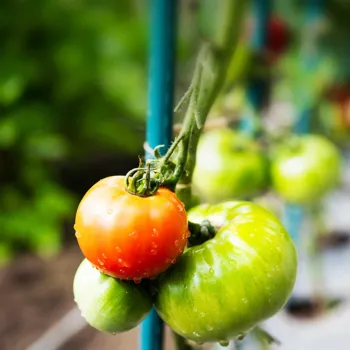Discover the world of sustainable gardening with native plants and composting. Learn to conserve water, nurture nature, sustain soil, and harvest heritage for a greener, healthier India. Dive into essential
tips and practices for a flourishing garden!
In the hustle-bustle of our city lives, it's easy to lose touch with Mother Earth. But imagine having your own little green haven, right in your backyard or even on your balcony!
Sustainable gardening is not just a hobby; it's a way to reconnect with nature, grow your own food (chemical-free, mind you!), and contribute to a healthier planet.
So, ditch the store-bought veggies sometimes and let's explore ten essential tips to get you started on your sustainable gardening journey in true Indian style!
Embrace the Magic of Native Plants
Forget those exotic blooms you saw in a magazine. The real stars of sustainable gardening are our desi plants! Native plants are perfectly adapted to our local climate and soil conditions. This means they need less water, less fertilizer, and are naturally resistant to local pests.
Think of marigolds (genda), basil (tulsi), neem, and local varieties of spinach (palak) or eggplant (baingan). They attract local pollinators like bees and butterflies, creating a vibrant and balanced ecosystem in your garden. Plus, they look absolutely stunning!
Growing native helps preserve our biodiversity and keeps things truly Indian.
Composting
From Waste to Wonderful Resource: One man's trash is another gardener's treasure! Composting is the process of recycling organic waste into a nutrient-rich soil amendment.
Kitchen scraps like vegetable peels, fruit cores, tea bags, and coffee grounds, along with yard waste like dried leaves and grass clippings, can be transformed into "black gold" for your garden.
Composting reduces landfill waste, enriches your soil naturally, and reduces your dependence on chemical fertilizers. You can use a simple compost bin or even a heap in a corner of your garden. Give it a little time, and you'll have the most amazing soil conditioner for your plants.
Imagine growing your tomatoes with the help of your own kitchen waste– talk about sustainable!
Water Wisely: The 'Drip is Hip' Mantra: Water is precious! And overwatering is a common mistake that many new gardeners make. Sustainable gardening is all about using water efficiently. Install a drip irrigation system to deliver water directly to the roots of your plants, minimizing water loss through evaporation. Collect rainwater in barrels or tanks to use for watering your garden. Water your plants early in the morning or late in the evening to reduce evaporation. Group plants with similar water needs together so you don't overwater some while underwatering others. Mulch around your plants with organic materials helps retain moisture in the soil.
Remember, every drop counts.
Natural Pest Control
Say No to Chemicals: Forget those harsh chemical pesticides! They harm beneficial insects, pollute the soil, and can even be harmful to us. Embrace natural pest control methods instead. Plant companion plants like marigolds and basil, which repel pests naturally.
Introduce beneficial insects like ladybugs, which eat aphids. Use neem oil, a natural pesticide derived from the neem tree, to control a wide range of pests. Handpick pests off your plants whenever possible. Create a healthy garden ecosystem that can resist pests naturally.
When you do all ofthis your garden will flourish without harmful chemicals.
Mulching Magic
Nature's Blanket: Mulching is like giving your garden a cozy blanket. It involves covering the soil around your plants with organic materials like straw, wood chips, shredded leaves, or even newspaper.
Mulching helps retain moisture in the soil, suppresses weeds, regulates soil temperature, and enriches the soil as it decomposes. It reduces the need for watering and weeding, making your gardening life much easier. Plus, it gives your garden a neat and tidy look.
Apply a layer of mulch around your plants every spring and fall and watch your garden thrive.
Crop Rotation
Keep the Soil Happy: Don't plant the same crops in the same spot year after year. That depletes the soil of specific nutrients. Crop rotation involves planting different types of crops in the same area in a planned sequence.
This helps balance nutrient levels in the soil, reduce pest and disease buildup, and improve soil structure. For example, you can follow a heavy feeder like tomatoes with a legume crop like beans, which adds nitrogen to the soil. Plan your garden layout carefully and rotate your crops each season.
Happy soil means happy plants, which in turn means healthier produce for you.
Seed Saving
Preserve Our Heritage: Seeds are the essence of life. Save seeds from your best-performing plants each season. This helps preserve local varieties and adapt them to your specific growing conditions. It's also a great way to reduce your gardening costs. Collect seeds from ripe fruits and vegetables.

Dry them thoroughly and store them in a cool, dry place until the next season. Seed saving is a tradition that has been passed down through generations of Indian farmers, and it's a great way to connect with our agricultural heritage.
You could swap seeds with local gardeners, creating a community of green thumbs.
Vertical Gardening
Grow Up, Not Out: Limited space? No problem! Vertical gardening allows you to grow plants on walls, fences, and trellises. It's perfect for balconies, patios, and small urban gardens. Use climbing plants like beans, cucumbers, and gourds.
Create vertical planters using recycled materials like plastic bottles, wooden pallets, or old tires. Vertical gardening is a space-saving, visually appealing, and productive way to grow your own food. It's amazing how much you can grow in a small area with a bit of creativity.
Embrace Permaculture Principles
Permaculture is a sustainable design system that mimics natural ecosystems. It emphasizes working with nature, not against it. Design your garden to be self-sustaining and interconnected. Observe your local climate and soil conditions. Use natural resources wisely.
Create a diverse and resilient garden ecosystem that requires minimal intervention. Permaculture is a holistic approach to gardening that benefits both the environment and the gardener.
Grow Organic Herbs
Taste And Health Grow organic herb to provide nutrients to your family. Organic herbs can be grown in terrace garden to make your terrace/backyard more beautiful.
Sustainable gardening is a journey, not a destination. Start small, experiment, and learn from your mistakes. Connect with other gardeners in your community. Share your knowledge and experiences. Together, we can create a greener, healthier, and more sustainable India, one garden at a time! Happy gardening!
Paragraph 1 : Embracing Sustainability:
Native plants adapt well to climate, requiring less water and fertilizer. Marigold (genda) and basil (tulsi) attract local pollinators. Growing native promotes biodiversity in Indian gardens.
Paragraph 2 : Composting Benefits:
Composting turns kitchen waste into nutrient-rich soil. Vegetable peels and coffee grounds enrich garden soil. It reduces landfill waste, and dependence on chemical fertilizers..
Paragraph 3 : Conserving Water :
Use drip method to deliver water directly to the Plant Roots. Conserve water by collecting rain water in tanks. This reduces waterloss because of evaporation..
Paragraph 4 : Nurturing Nature:
Natural pest control avoids harmful chemicals.
Marigolds & basil repel pests and Neem oil controls pests. Your garden can flourish without chemical interventions.
Paragraph 5 : Sustaining soil:
Mulching is a covering of soil, Use straws and newspapers for gardening. It increases soil moisture and controls weeds.
These activities helps to sustain the soil..
Paragraph 6 : Harvest Heritage:
Saving seed provides a resource for local species. Saving seeds helps reduce gardening costs, and adapting plants. It also connects with tradition and helps swap communities.













